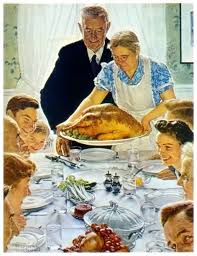
None of us can remember the first time it happened, but along with my mom's green beans that had been cooked to death, the annual burning of the rolls became a Thanksgiving tradition when I was growing up.
"This year," mom would promise and proclaim,
"this year, it won't happen." But it did. The store-bought dinner rolls were slipped into the oven in their little aluminum trays, and well, there was always some kind of distraction. The blessing went on a little too long, there was jockeying for position at the table, someone's water glass tipped over, or the rolls were simply forgotten.
And then, with exact timing 3-2-1, we all heard Mom's shriek from the kitchen as she discovered the charred rolls. More than once, the smoke detector alerted us to the obvious. The back door was opened to let out the smoke into the bitter Chicago air. And the bread, now appearing as lumps of charcoal, once again was deleted from the menu, ending up still smoking in the trash.
Mom would look surprised for a moment as if "how did that happen?" and then, she would laugh. And we would chuckle
with her, grace not covering up her mistakes, but redeeming them.
Realizing that Thanksgiving comes suddenly upon us next week, a family email was circulated among our daughters yesterday, soliciting Thanksgiving menu requests. Let the creativity commence. And may the cornbread dressing retain its rightful place of honor..
My husband's request for the meal? "I am just glad to be together," a rare and precious time now that our family are scattered across two time zones.
It's not about the perfect table, or perfect food, or a perfect family, but thankfulness to God for what we do have, for what He has done this year, and for Who He is.
Many friends have shared with me their anxieties about the holidays, and it doesn't have anything to do with the menu, but bitter grapes, long-seasoned animosity, and overcooked bad attitudes, things that don't belong. Breaking those traditions means taking the high road there and bringing a huge plate of grace to the table.
Saying grace refers to a short prayer or an expression of thankfulness to God, traditionally said before a meal. It is not meant to be a recitation, but a realization of God's favor.
Bringing grace is a state of being that results in an
intentional mindset and heart prepared to express a love that is not earned. Grace releases us from expecting perfection in others, and fills in the cracks with an impossible love. The most important person in the room is not you, but the one that needs
your love the most.
Who is saying grace this year?
More importantly,
am I bringing grace?
Grace covers it all, even when provoked. Grace changes it all, especially me.
A commercial last night showed a family joyously arriving for Thanksgiving dinner. "It's going to be perfect," the narrator said.
Think instead: "No, it's going to be
grace."
Because that is what God has given us.
And from His fullness
we have all received,
grace upon grace.
John 1 16
If I want things to be different,
something has to change.
And that would be me.
Finally, brethren, whatever is true,
whatever is honorable,
whatever is just,
whatever is pure,
whatever is lovely,
whatever is gracious,
if there is any excellence,
if there is anything worthy of praise,
think about these things.
What you have learned
and received and heard
and seen in me,
do,
and the God of peace will be with you.
Philippians 4. 8-9
Practice grace in this.
May we not just say grace as a formality,
but bring grace as a personal gift.
It is not that it will be the perfect holiday,
impossible with imperfect humans all in one room,
but that is what grace is all about.
Do not forget why we come together:
not to be thankful,
but to
thank God.
He is the honored guest.
